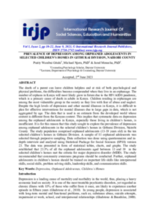Abstract:
The death of a parent can leave children helpless and at risk of both psychological and physical problems, the difficulties become compounded when they live in an orphanage. The number of orphans in Kenya will most likely grow in future due to the HIV/AIDS pandemic, which is a primary cause of death in adults in Kenya. Children residing in orphanages are among the most vulnerable group in the society as they live with fear of abuse and neglect. Despite the high levels of depression and other mental illnesses in Kenya, it is difficult to plan for effective interventions for mental illnesses due to large gaps in data, which is not aggregated by age.
The data that is used is an estimate from the developed world whose context is different from the Kenyan context. This implies that systematic data on depression among the orphaned adolescents in Kenya, especially those living in children’s homes, is insufficient. It is for this reason that this study sought to explore the prevalence of depression among orphaned adolescents in the selected children’s homes in Githurai Division, Nairobi County. The study population comprised orphaned adolescents (13-19 years old) in the ten selected children’s homes in Githurai Division. A sample of 81 orphaned adolescents was selected through purposive sampling. Data collection was done using questionnaires and indepth interview and analysed using Statistical Package for Social Sciences (SPSS) version 23. The data was presented in form of statistical tables, charts, and graphs.
The study established that 23.5% of all the orphaned adolescents aged between 13 and 19 in the selected children’s homes met the criteria for major depressive disorder (MDD). The study recommended that community awareness programs should be conducted. Further, orphaned adolescents in children’s homes should be trained on important life skills like interpersonal skills, social skills, problem solving skills, leadership skills, and communication skills.

